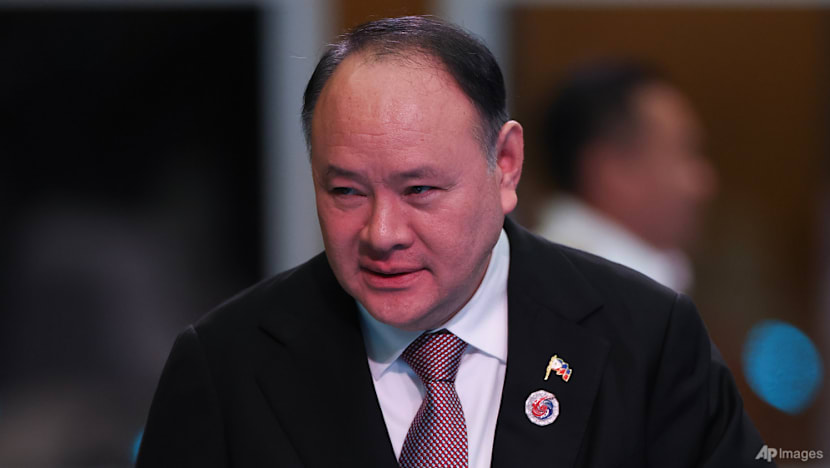World
Canada and Philippines Forge Defence Pact Amid South China Sea Tensions

On November 2, 2023, Canada and the Philippines signed a significant defence agreement aimed at enhancing military cooperation and joint combat readiness amid rising tensions in the South China Sea. This pact enables the two nations to conduct joint exercises and strengthens their security alliances to deter aggression, particularly from China, which has increasingly asserted its claims over the disputed waters.
Philippine officials revealed that the Status of Visiting Forces Agreement was signed by Philippine Defense Secretary Gilberto Teodoro Jr. and his Canadian counterpart, David McGuinty, during a meeting in Manila. This agreement will come into effect following ratification and establishes a legal framework for the temporary presence of foreign troops, allowing for large-scale military exercises in each other’s territories.
Strategic Military Alliances in the Indo-Pacific
The agreement reflects a broader strategy by Canada and other Western nations to bolster their military presence in the Indo-Pacific region. This effort coincides with President Ferdinand Marcos Jr.‘s initiatives to strengthen the Philippine military, which has historically faced challenges in terms of funding and resources, particularly in light of China’s military superiority.
Since taking office, Marcos has sought to forge closer defence ties with several countries, resulting in agreements similar to the one signed with Canada. This pact marks the third under his administration, following agreements with Japan and New Zealand. Ongoing discussions are in progress to establish similar agreements with France and Singapore, with potential future negotiations involving the United Kingdom, Germany, and India.
The Philippines has a long history of defence pacts, having signed its first agreement with the United States in 1998, which laid the groundwork for military cooperation. This strategic alignment is increasingly critical as regional tensions escalate, particularly due to China’s claims over nearly all of the South China Sea despite a 2016 international ruling that largely dismissed these claims.
Criticism of China’s Actions and Regional Stability
China has faced criticism from both the Philippines and Canada for its aggressive maneuvers in the South China Sea. Recently, the Chinese government announced plans to establish a “nature reserve” in the Scarborough Shoal, which is claimed by both nations. Teodoro condemned this declaration during an annual meeting of defence ministers from the Association of Southeast Asian Nations (ASEAN), describing it as a veiled attempt to exert military influence over smaller countries. He stated, “This, to us, is a veiled attempt to wield military might and the threat for use of force, undermining the rights of smaller countries and their citizens who rely on the bounty of these waters.”
Canada has echoed these concerns, explicitly opposing China’s use of environmental initiatives as a means to assert control over disputed territories. The Canadian government expressed alarm over incidents where Chinese vessels employed water cannons against Philippine ships, resulting in injuries to Filipino personnel. David Hartman, the Canadian Ambassador to Manila, reiterated Canada’s commitment to addressing China’s provocative actions in the region.
Both nations are working to navigate the complexities of regional security while addressing the ongoing challenges posed by China’s expansive territorial claims. As military exercises between Canada and the Philippines become more frequent, the implications for regional stability and international maritime law continue to unfold.
Last year, Canada and the Philippines enhanced their defence cooperation further with an agreement granting the Philippines access to Canada’s “Dark Vessel Detection System.” This advanced technology helps track illegal maritime activities, enabling the Philippine coast guard to monitor Chinese vessels operating in the South China Sea.
As the geopolitical landscape evolves, the implications of this defence pact will be closely monitored, particularly regarding its potential to reshape security dynamics in the Indo-Pacific and the ongoing disputes in the South China Sea.
-

 Lifestyle3 months ago
Lifestyle3 months agoHumanism Camp Engages 250 Youths in Summer Fest 2025
-

 Sports3 months ago
Sports3 months agoDe Minaur Triumphs at Washington Open After Thrilling Comeback
-

 Business4 months ago
Business4 months agoKenvue Dismisses CEO Thibaut Mongon as Strategic Review Advances
-

 Sports4 months ago
Sports4 months agoTupou and Daugunu Join First Nations Squad for Lions Clash
-

 Top Stories4 months ago
Top Stories4 months agoColombian Senator Miguel Uribe Shows Signs of Recovery After Attack
-

 World4 months ago
World4 months agoASEAN Gears Up for Historic Joint Meeting of Foreign and Economic Ministers
-

 Business4 months ago
Business4 months agoOil Prices Surge Following New EU Sanctions on Russia
-

 Entertainment3 months ago
Entertainment3 months agoDetaşe-Sabah Violin Ensemble Captivates at Gabala Music Festival
-

 Health3 months ago
Health3 months agoNew Study Challenges Assumptions About Aging and Inflammation
-

 Entertainment3 months ago
Entertainment3 months agoBaku Metro Extends Hours for Justin Timberlake Concert
-

 Business4 months ago
Business4 months agoU.S. House Approves Stablecoin Bill, Sends to Trump for Signature
-

 Top Stories4 months ago
Top Stories4 months agoRethinking Singapore’s F&B Regulations Amid Business Closures









